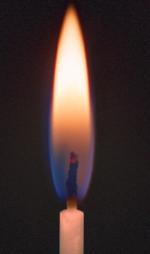

Yogi Berra once said, "You can observe a lot by just watching." What he meant by this is that observation requires more than simply using your eyes . It also requires critical thinking during the observation process. You should be asking yourself questions about what you are seeing and why the behavior you are observing is taking place. That is, you should be formulating hypotheses and testing those hypotheses on a limited basis. This type of observation is extremely important in science since it provide the main method of acquiring data, detecting errors and unexpected occurrences, and achieving ultimate success in whatever component of science you are engaged in.
 |
In this experiment you will observe a deceptively simple process: a burning candle. In fact, what takes place during the initiation and dynamically stable combustion process is enormously complex. There are insights into basic physics and chemistry which are important for you to be aware of and can illustrate for you the importance of critical observations. |  |
The key aspect of critical observation involves self-questioning. That is, you must learn to formulate questions based on what you are seeing that you can either answer immediately or attempt to answer at a later time. This type of question/answer dialogue, carried out internally, provides the mental aspect to the observation process which is so crucial in extending the data acquisition to understanding and application. (For example, see this note on the discovery of penicillin.)
Are you ready to test your powers of observation by answering...

|

|

|